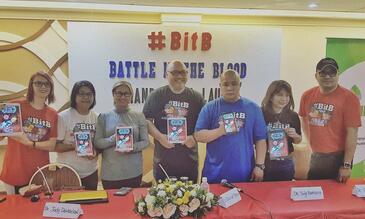
HIV Gaming, Engaging and Testing Project (HIV GET Tested) is a 3-year pilot study, exploring the feasibility of digital gaming and self-testing as a means to increase access to vital health services among key populations in the Philippines. Clinics providing HIV testing and treatment services in Manila and Davao will also be mapped and monitored to identify possible areas for service improvement. Data generated from this project will build an evidence base to assist the Philippines Department of Health in developing tailored health services and advocacy campaigns for adolescent and young males who have sex with males, the population most affected by the rapidly emerging epidemic. The project commenced in January 2016.
Objectives:
- Develop a digital game to address identified barriers to HIV services
- Assess the feasibility (demand, acceptability and limited efficacy) of the digital game within the Philippines context
- Assess the readiness for HIV self-testing in the Philippines among stakeholders and target users
Project Activities
Evidence-based game design:
The first phase consisted of formative research to identify key enablers and barriers to HIV testing and treatment services. A series of interviews were conducted with males who have sex with males (MSM) and transgender women to explore knowledge of HIV and perspectives of health services available in the Philippines. An online and face to face survey was then conducted with just over 900 respondents to further assess the frequency of themes extracted from the interviews.
Researchers from the LSTM and the University of the Philippines conducted a 4-day workshop to develop a list of learning objectives and specification for the game using findings from the formative research. In partnership with EM Studios, ETCH translated outputs from the workshop into a game design document. 
*participants from a focus group discussion at a very early stage of the development. All particpants gave permission for the use of their image for project communication only.
Using the acceptability study to inform the game development:
Focus group discussions with target users were conducted at each game development milestone, from early concept art to the version of the game released on the app stores. Utilising ETCH's expertise in user testing, information gathered from each session was not only used to determine the acceptability of the game but to also influence the game development. Each user-led change improved the usability of the game, the enjoyment and most importantly the understanding of key health messages.
Using industry standard and custom game analytics to assess demand:
Careful selection of game metrics enables us to take an in-depth look at game uptake, retention, player choice and progress. The custom analytics developed for Battle in the Blood will predominantly be used to monitor demand as part of the feasibility study. To assess if Battle in the Blood is reaching key populations in the Philippines, custom metrics using geolocation data and responses to in-game demographic questions on age, gender and sexual behaviour are being piloted.
Game analytics are regularly monitored to identify sticking points in the game. For example, if significant player drop-out on a particular level is observed then stats in the game can be edited to re-balance the difficulty. Most stats can be edited outside the game engine without the need to release an update to all users.
All game data is anonymised and users can opt out of providing some or all of the data and still access all features in the game. The HIV G.E.T Tested team strive to be completly transparent and upfront with users on the collection and use of data by presenting information in simplified language both in the game and app store presence.
HIV self-testing:
During the formative research stage of the HIV GET Tested project, members of the MSM and transgender population demonstrated a clear desire for discreet and convenient testing services, wherein a self-testing model could be ideal. While unregulated HIV testing kits are available for purchase online in the Philippines, research into effective distribution models and policy pathways for self-testing are non-existent. As a first step, a qualitative study was conducted to explore the current status of regulation and perceptions of self-testing among stakeholders, as well as knowledge, perceptions and current practices from target users. The HIV GET Tested project team believe gaming has potential to address challenges in uptake and use of self-testing. How we bring gaming and self-testing together is still to be explored. What has always been clear is our game must be responsive to the ever-changing demand and architecture of health services in the Philippines.
Read our article in BMC Public Health on the Philippine readiness for HIV self-testing here.
Project Outputs
Battle in the Blood - available for free on Google Play and App Store now.
Hemingway C, Baja ES, Dalmacion GV, Medina PMB, Guevara EG, Sy TR, Dacombe R, Dormann C, Taegtmeyer M. Development of a Mobile Game to Influence Behavior Determinants of HIV Service Uptake Among Key Populations in the Philippines: User-Centered Design Process. JMIR Serious Games. 2019 Dec 20;7(4):e13695. doi: 10.2196/13695. PMID: 31859673; PMCID: PMC6942189.
Project Partners and Collaborators
Implementing agencies of the HIV GET Tested project is the Department of Clinical Epidemiology, University of the Philippines, the Department of International Public Health, LSTM. Cooperating agencies are ETCH, Philippines Department of Health, LoveYourself Inc, Quezon City Local Government, Davao Local Government and EM Studios.
Philippine principal investigator - Dr Emmanuel Baja
Email - esbaja@gmail.com
UK principal investigator - Dr Miriam Taegtmeyer
Funders
Funding agencies for the Newton Agham Grant are the UK Government through the Medical Research Council and Philippines Government through the Philippines Council of Health Research and Development, Department of Science and Technology.

